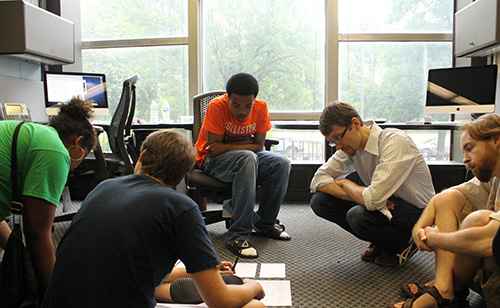Game Changer Chicago Awarded $1 Million MacArthur Foundation Grant

The following article was published by UChicago News on 24 March.
The John D. and Catherine T. MacArthur Foundation is again lending its support to the innovative use of gameplay and design to engage youth in lessons of health and life. The foundation has awarded $1 million over two years to the Game Changer Chicago Design Lab to advance its work developing game-based learning experiences that promote sexual and reproductive health, academic success, civic engagement and overall well-being among urban youth.
The GCC Design Lab is among the signature programs of the Center for Interdisciplinary Inquiry and Innovation in Sexual and Reproductive Health (Ci3) at the University of Chicago. Created in 2012, Ci3 draws insight from the University's renowned researchers across multiple disciplines, including medicine, literature, sociology, psychology, economics and policy. Programs affiliated with the center take on issues of reproductive health, sexuality, and the underlying systems that impact physical, emotional, social and economic wellbeing.
It is also among the inaugural research projects supported by the Neubauer Collegium for Culture and Society at the University of Chicago. The Neubauer Collegium supports innovative and collaborative research projects led by UChicago faculty, hosts visiting fellows from around the world and pioneers efforts to engage a wider public in humanistic scholarship.
The grant will fund an expansion of the GCC Design Lab's programs and experimental projects, including new game prototypes and curricular development. The support also will help the GCC Design Lab broaden its implementation in schools and community organizations, conduct research and analysis, and generate critical policy recommendations from the findings.
Under the direction of founder Melissa Gilliam, professor of Obstetrics and Gynecology and Pediatrics, chief of the Section of Family Planning and Contraceptive Research, and dean for Diversity and Inclusion in the Biological Sciences Division, this unconventional collaboration is breaking new ground with platforms like the GCC Design Lab, bridging research and innovations in medical practice, health education and policy.
"We're extremely honored and excited to have the support of the MacArthur Foundation to expand Ci3’s Game Changer Chicago Design Lab," said Patrick Jagoda, GCC Design Lab co-founder and assistant professor of English. "Our ultimate goal is to demonstrate that working in collaborative teams, addressing complex social problems through gameplay, learning through hands-on experience, and being mentored by knowledgeable and engaged adults can engender skills that help youth thrive."
For Jagoda, the GCC Design Lab team and community partners, the GCC Design Lab's games have been powerful evidence that the next generation, or "Generation Z" responds to learning predicated on collaboration and media literacies. These highly diverse digital natives, born between 1995 and 2012, thrive in environments that are more conducive to creativity and impactful experiences.
"For the youth with whom we work, games serve as a powerful medium for tackling the myriad inequalities of the early 21st century," said Jagoda. "Games garner curiosity, motivation, effort and optimism about the possibility of completing a challenge. They serve as a space that encourages experimentation, safe failure and resilience. They activate multiple learning styles, including forms of social and interpersonal learning through play. Instead of simply feeding information to youth, we hope to engage them in dynamic environments that teach them to think critically, engage their communities and take on the large-scale problems of our time."
Foundation support will enable the GCC Design Lab to continue its innovative work in designing prototypes and conducting large-scale summer programs. "Now we will focus on increasing the impact of technology and game-based interventions on youth," said Gilliam. "Our goal is to scale and disseminate our games and expand our programs beyond summer, providing longitudinal support to youth."
The Lab also will create longitudinal learning pathways, which might include games, mentoring and internships over one or more years to open opportunities in STEM and health careers to youth from groups that are traditionally underrepresented in these fields.